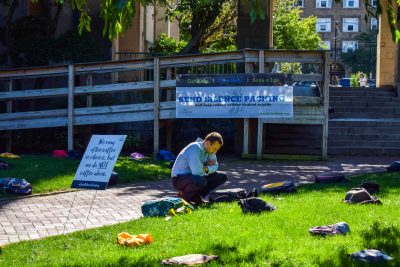
A team of Boston University students will participate in the American Foundation for Suicide Prevention’s (AFSP) Boston Out of the Darkness Walk to raise funds and awareness about the topics of suicide and mental health.
The walk, which was postponed for a week due to the recent nor’easter, will take place on Saturday and follows a one-mile loop around Government Center, said Tara Greeley, AFSP’s Eastern Massachusetts area director.
College of Communication junior Jennifer Kochanski said she was inspired to join the team by COM junior Haley Fritz, who organized the team, and many others who struggle with mental health every day.
“[Fritz] has been really open with her mental health journey, and we’ve definitely talked about mental health issues,” Kochanski said. “… So when she mentioned that she’s going to walk, I wanted to support her, but I also wanted to support everyone else who’s attending the walk.”
Kochanski said she also decided to participate because she feels it is especially important to spread suicide awareness amid the stress and worry of the modern era.
“Unfortunately, mental health is not getting better,” Kochanski said. “With social media and the stress of college, mental health is going to continue being an issue, so we’re going to continue having to raise awareness for issues such as suicide.”
Greeley commended the participating students for donating their time and effort to join the fight against suicide and engage with the Boston community.
“I think it’s amazing, and I think that congratulations are in order,” Greeley said, “because by really opting into this kind of activity and event, not only is it philanthropic and you’re doing it for your own community, but you’re addressing a need that has become really evident not just on college campuses but in our society in general.”
Greeley said ASFP began organizing these walks as a way to “be present in the community and reach people on the topic” in hopes that the event can act as a platform for people to speak in solidarity with and in support of those struggling with their mental health.
Dori Hutchinson, director of services of the Sargent College of Health and Rehabilitation Sciences’ Center for Psychiatric Rehabilitation, wrote in an email that both on-campus and off-campus events, like the walk, are important because they generate a conversation about suicide that can eventually lead to concrete action.
“[Conversation] will help bring about change in attitudes, practices and policies,” Hutchinson wrote. “Silence is deadly..not talking about suicide only reinforces all the factors as to why people won’t and don’t seek help.”
So far, the Boston Out of the Darkness Walk has already raised over $340,000, according to its website, far exceeding its goal of $302,000. According to Greeley, these funds will be used to support research and expand the foundation’s advocacy and survivor outreach programs, both national and local.
Greeley said that college students are particularly vital in the effort to prevent suicide, as they are the first ones who can recognize any friends struggling with mental health issues and connect them to the resources they need.
“[Students are] a demographic that we really want to target to talk about why it’s happening and how we can prevent it and how they can be agents of change themselves,” Greeley said. “So it does become really important to get the entire community on board with this, because you never know if you’re going to be someone who can step in and help save a life.”
COM freshman Angelo Facciponti-Mennella said he values these efforts to raise awareness and combat the rise of suicide.
“I have very close friends who have personally experienced issues relating to that, and I think it’s a very important cause,” Facciponti-Mennella said. “I think some people tend to not realize the scope of it, some people think perhaps it’s not as much of a rampant, large issue as it is.”
Danielle Klapper, a freshman in the Wheelock College of Education and Human Development, said she applauds the BU team and recognizes that the topic of mental health needs all the support it can get.
“I think that’s amazing, I think that we absolutely need more focus on suicide prevention,” Klapper said. “I think it’s an ongoing issue among kids our age, and I think it’s really great.”
College of Fine Arts sophomore Julia Klauss said that in the end, the best way to help students fighting mental illness is to increase suicide prevention education and improve access to suicide prevention resources.
“The behavioral medicine services are always there, but that’s not for long-term treatment,” Klauss said. “… They [need] something there for long-term treatment, because if you don’t have insurance, then it’s expensive to go see a counselor or a psychiatrist or somebody off campus.”
Greeley said because the walk was delayed, students can still register to support suicide prevention on the AFSP website by participating or volunteering at the walk.
“It’s a great opportunity to connect to people who are battling mental health challenges, who are survivors of suicide loss, who have struggled themselves,” Greeley said. “And it’s just a really wonderful way to come together in a community.”






















































































































